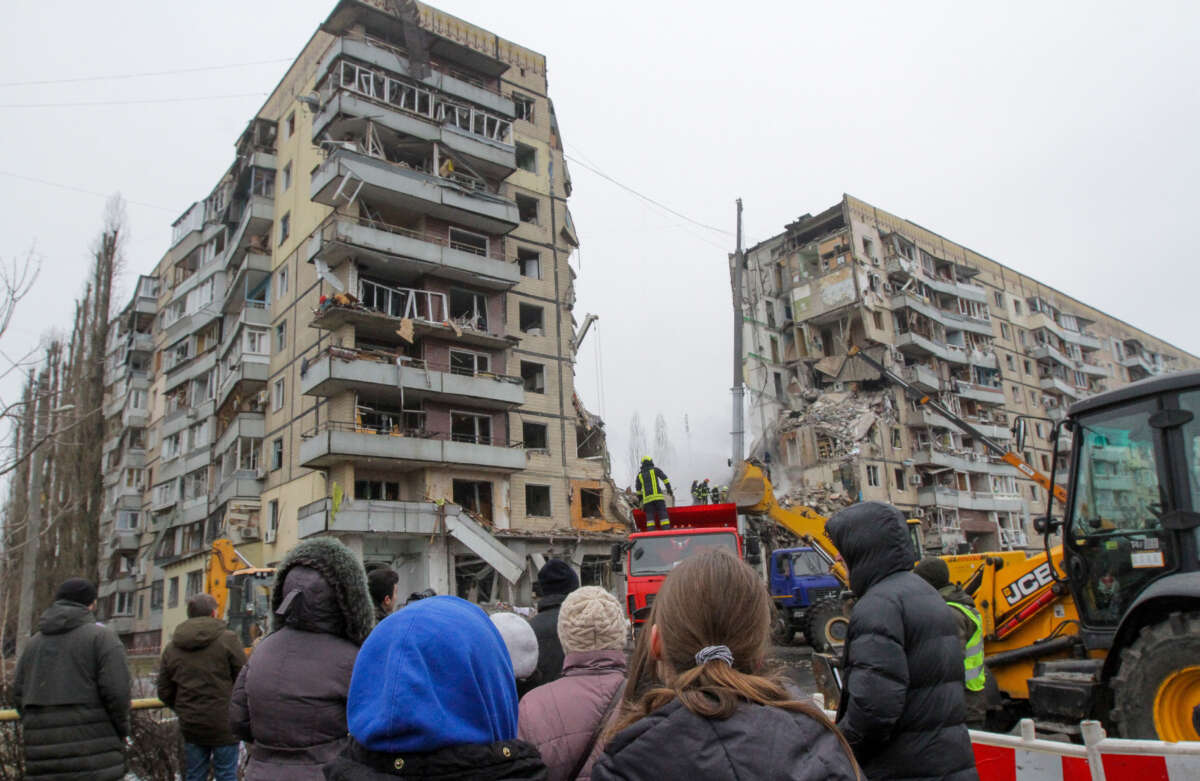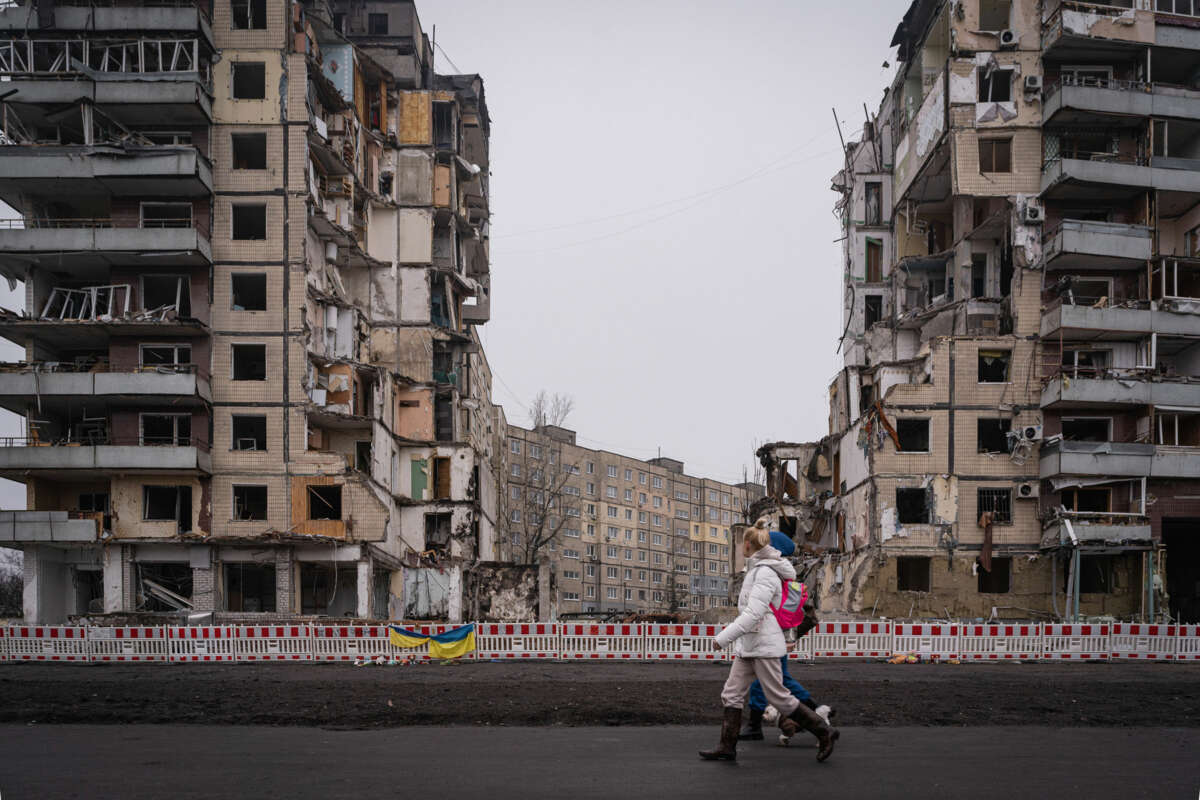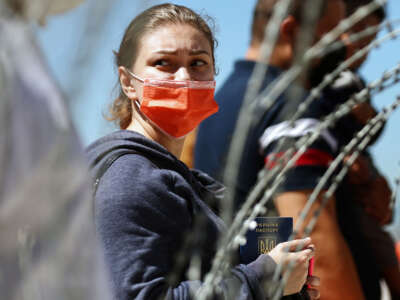Solidarity with Ukraine!
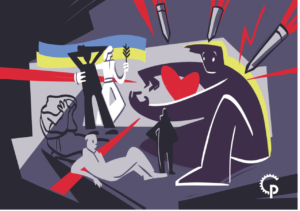
Picture about the importance of mutual assistance and cooperation during the Ukraine war. Katya Gritseva, 2022, digital art, Kharkiv
Statement of the Ukraine Solidarity Network
The brutal Russian invasion of Ukraine has been a litmus test for the Left. A principled and strategic commitment to the Ukrainian people, in their defense against Russian imperialism offers the answer.
Arising out of the Socialism 2022 Conference—held in Chicago over Labor Day weekend—and inspired by a session led by Ukrainian political economist and activist Yuliya Yurchenko, a group of mainly U.S. leftists came together to form what has become the Ukraine Solidarity Network – U.S. (“USN-US”). Over the last few months, and with active support from both Ukrainian leftists (such as Social Movement / Sotsialnyi Rukh), and the growing international solidarity movement, the USN-US is seeking to grow and gain support.
New Politics is built on a commitment to the politics of socialism from below and the vision of a “third camp,” which looks to the force of the working class and the oppressed, and not to rival capitalist states, as the key to our collective liberation. The work of the USN-US, in seeking to support “Ukraine’s war of resistance, its right to determine the means and objectives of its own struggle,” while “stand[ing] in opposition to all domination by powerful nations and states, including by the United States and its allies, over smaller ones and oppressed peoples” is consonant with our vision. We republish that statement here and encourage readers to add their names to the list of signatories.
The Ukraine Solidarity Network (U.S.) reaches out to unions, communities and individuals from diverse backgrounds to build moral, political and material support for the people of Ukraine in their resistance to Russia’s criminal invasion and their struggle for an independent, egalitarian and democratic country.
The war against Ukraine is a horrible and destructive disaster in the human suffering and economic devastation it has already caused, not only for Ukraine and its people but also in its impact on global hunger and energy supplies, on the world environmental crisis, and on the lives of ordinary Russian people who are sacrificed for Putin’s war. The war also carries the risk of escalation to a direct confrontation among military great powers, with unthinkable possible consequences.
It is urgent to end this war as soon as possible. This can only be achieved through the success of Ukraine’s resistance to Russia’s invasion. Ukraine is fighting a legitimate war of self-defense, indeed a war for its survival as a nation. Calling for “peace” in the abstract is meaningless in these circumstances.
The Ukraine Solidarity Network (U.S.) supports Ukraine’s war of resistance, its right to determine the means and objectives of its own struggle—and we support its right to obtain the weapons it needs from any available source. We are united in our support for Ukraine’s people, their military and civilian defense against aggression, and for the reconstruction of the country in the interests of the majority of its population. We stand in opposition to all domination by powerful nations and states, including by the United States and its allies, over smaller ones and oppressed peoples.
We uphold the following principles and goals:
1) We strive for a world free of global-power domination at the expense of smaller nations. We oppose war and authoritarianism no matter which state it comes from, and support the right of self-determination and self-defense for any oppressed nation.
2) We support Ukraine’s victory against the Russian invasion, and its right to reparations to meet the costs of reconstruction after the colossal destruction it is suffering.
3) The reconstruction of Ukraine also demands the cancellation of its debts to international financial institutions. Aid to Ukraine must come without strings attached, above all without crushing debt burdens.
4) We recognize the suffering that this war imposes on people in Russia, most intensely on the ethnic and religious minority sectors of the Russian Federation which are disproportionately impacted by forced military conscription. We salute the brave Russian antiwar forces speaking out and demonstrating in the face of severe repression, and we are encouraged by the popular resistance to the draft of soldiers to become cannon fodder for Putin’s unjust war of aggression.
5) We seek to build connections to progressive organizations and movements in Ukraine and with the labor movement, which represents the biggest part of Ukrainian civil society, and to link Ukrainian civic organizations, marginalized communities and trade unions with counterpart organizations in the United States. We support Ukrainian struggles for ensuring just and fair labor rights for its population, especially during the war, as there are no military reasons to implement laws that threaten the social rights of Ukrainians, including those who are fighting in the front lines.
There are more than 100 initial signatories to this statement, including the individuals listed below. To add your own name, please go to ukraine-solidarity-network@googlegroups.com.
Check the online version of this statement on the New Politics website for a link to the full list of names.
Frieda Afary
Iranian American Feminists
Molly Crabapple
Visual Artist, contributing editor VICE magazine
Dr. Ron Daniels
Institute for the Black World-21 ACTION, International Activist
Cindy Domingo
Legacy of Equality Leadership and Organizing (LELO), Seattle
Eric Draitser
Author, Podcaster, CounterPunch Radio
John Feffer
Institute for Policy Studies, Foreign Policy in Focus, Aftershock: A Journey into Eastern Europe’s Broken Dreams.
Sue Ferguson
Assoc. Professor Emerita, Wilfred Laurier University, Women and Work: Feminism, Labour, and Social Reproduction
Bill Fletcher Jr.
The Real News Network
Mindy Thompson Fullilove
The New School, People’s Center for Disease Control, From Enforcers to Guardians: A Public Health Primer on Ending Police Violence
Shiyam Galyon
Comms Strategist, Pub in Teen Vogue, TruthOut, Syrian-American activist
Dayne Goodwin
AFSCME Local 1004, DSA Salt Lake
Howie Hawkins
Green Party Presidential Candidate 2020
Meizhu Lui
Former Director United for a Fair Economy, Co-author The Color of Wealth
Peter McLaren
Distinguished Professor, Chapman University, Emeritus Professor UCLA, Emeritus Professor Miami University
Naomi Murakowa
Assoc Professor, Princeton Univ, The First Civil Right: How Liberals Built Prison America
Joshua Pechtalt
California Federation of Teachers, Former President
Haley Pessin
DSA Afrosocialist Caucus
Jamala Rogers
Founder & Past Executive Director of Organization for Black Struggles (St. Louis); author
Don Rojas
Independent Journalist/Activist
Tanya Vyhovsky
Vermont Legislature State Rep, DSA member, Ukrainian-American activist
Jeffery R. Webber
Associate Professor, York University Toronto, The Impasse of the Latin American Left
Suzi Weismann
KPFK Radio Los Angeles
Matthew Zawisky
Ukrainian American Civic Center, Buffalo NY
Jonathan Zenilman MD
Professor of Medicine, Johns Hopkins University
The name of the organization is listed for identification purposes only. The endorser’s position does not necessarily reflect the opinion of the institution.
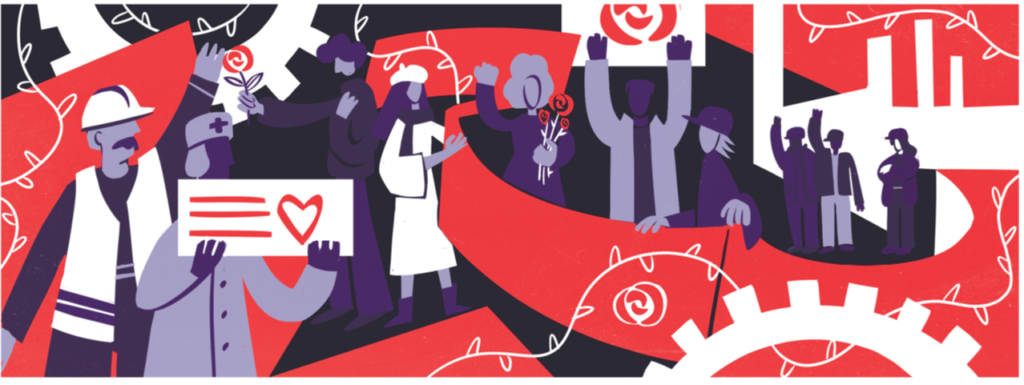
Picture for Social Movement, Katya Gritseva, 2022, digital art, Lviv
Our Slogan Is “War Against War”
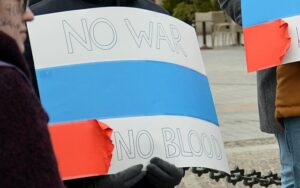 For a year now, Vladimir Putin’s regime has been killing Ukrainians, sending hundreds of thousands of Russians to their deaths, and threatening the world with nuclear weapons in the name of the insane goal of restoring its empire.
For a year now, Vladimir Putin’s regime has been killing Ukrainians, sending hundreds of thousands of Russians to their deaths, and threatening the world with nuclear weapons in the name of the insane goal of restoring its empire.
For us Russians who oppose Putin’s aggression and dictatorship, it has been a year of horror and shame over the war crimes committed daily in our name.
On the one-year anniversary of this war, we call all those who yearn for peace to turn out for demonstrations and rallies against Putin’s invasion.
Unfortunately, not all the “peace” rallies taking place next weekend will be actions of solidarity with Ukraine. A large part of the left in the West does not understand the nature of this war and advocates compromise with Putinism.
We have written this statement to help our comrades abroad understand the situation and take the right stand.
A counterrevolutionary war
Some Western writers attribute the war to causes like the collapse of the USSR, the “contradictory history of the Ukrainian nation’s creation,” and geopolitical confrontation between nuclear powers.
Without denying the importance of these factors, we are surprised that these lists overlook the most important and obvious reason for what is happening: the Putin regime’s desire to suppress democratic protest movements throughout the former Soviet Union and in Russia itself.
The 2014 seizure of Crimea and hostilities in the Donbas were a response by the Kremlin to the “revolution of dignity” in Ukraine, which overthrew the corrupt pro-Russian administration of Viktor Yanukovych, as well as to Russians’ mass demonstrations for fair elections in 2011–12 (known as the Bolotnaya Square protests).
Annexing the Crimean Peninsula was a domestic policy win for Putin. He successfully used revanchist, anti-Western, and traditionalist rhetoric (as well as political persecution) to expand his social base, isolate the opposition, and turn the Maidan into a bogeyman with which to frighten the population.
But the popularity boost that followed the annexation was short-lived. The late 2010s saw economic stagnation, an unpopular pension reform, and high-profile anti-corruption revelations by Alexei Navalny’s team that dragged Putin’s ratings back down, especially among young people. Protests swept the country, and the ruling United Russia party suffered a series of painful defeats in regional elections.
This context has driven the Kremlin to place all its bets on conserving the regime. The 2020 constitutional referendum (which required rigging unprecedented even by Russian standards) effectively made Putin a ruler for life. Under the pretext of containing the COVID-19 pandemic, protest gatherings were finally banned. An attempt was made to poison extra-parliamentary opposition leader Alexei Navalny, which he miraculously survived.
The popular uprising of summer 2020 in Belarus confirmed the Russian elite’s belief that the “collective West” is waging a “hybrid war” against Russia, attacking it and its satellites with “color revolutions.”
Of course, such claims are nothing more than a conspiracy theory. Social and political discontent in Russia has been growing due to record social inequality, poverty, corruption, rollbacks of civil liberties, and the obvious futility of the Russian model of capitalism, which is based on a parasitic fossil-fuel oligarchy appropriating natural resource rents.
If there’s one thing we can blame the “collective West” for, it’s its longstanding pandering to Putinism, including on the Ukrainian issue. For decades, European and American elites have sought to do “business as usual” with Putin’s Russia, which has allowed a dictatorship to emerge, redistribute wealth upwards, and conduct foreign policy with complete impunity.
Conceding to Putin will not lead to peace
Invading Ukraine was an attempt by Putin to repeat his 2014 Crimean triumph—by securing a speedy victory, rallying Russian society around the flag with revanchist slogans, finally crushing the opposition, and establishing himself as hegemon in the post-Soviet space (which Putin’s imperialism views as part of “historical Russia”).
Ukrainians’ heroic resistance thwarted these plans, turning the “short, victorious war” of the Kremlin’s dreams into a protracted conflict that has worn down Russia’s economy and busted the myth of its army’s invincibility. Backed into a corner, Moscow is threatening the world with its nuclear weapons while simultaneously urging Ukraine and the West to negotiate.
Moscow’s rhetoric is parroted by certain European and American leftists who oppose supplying arms to Ukraine (to “save lives” and prevent a nuclear apocalypse). But Russia is not willing to withdraw from the territories it has captured, a condition that Kyiv and 93% of Ukrainians consider non-negotiable. Must Ukraine instead sacrifice its sovereignty in order to appease the aggressor, a policy that has very dark precedents in European history?
Saving lives?
So is it true that Ukraine’s defeat, an inevitability if Western aid is withdrawn, will help prevent more casualties? Even if we accept the non-obvious (from a socialist perspective) logic that saving lives is more important than fighting tyranny and aggression, we believe that this is not the case.
As we know, Vladimir Putin has laid claim to the entire territory of Ukraine, asserting that Ukrainians and Russians are “one nation” and that Ukrainian statehood is a historical mistake. In this context, a ceasefire would merely give the Kremlin time to rebuild its military capacity for a new assault, including by forcing yet more Russians (mostly poor and ethnic minority) into the army.
If Ukraine continues to resist the invasion even without arms supplies, it will lead to innumerable casualties among Ukrainian soldiers and civilians. And terror, the horrific remains of which we saw in Bucha and elsewhere, is what awaits any of the new territories seized by Russia.
Multipolar imperialism
When Putin speaks about getting rid of American hegemony in the world and even about “anti-colonialism” (!), he is not referring to the creation of a more egalitarian world order.
Putin’s “multipolar world” is a world where democracy and human rights are no longer considered universal values, and so-called “great powers” have free rein in their respective geopolitical spheres of influence.
This essentially means restoring the system of international relations that existed in the run-up to World Wars I and II.
This “brave old world” would be a wonderful place for dictators, corrupt officials, and the far right. But it would be hell for workers, ethnic minorities, women, LGBT people, small nations, and all liberation movements.
A victory for Putin in Ukraine would not restore the pre-war status quo, it would set a deadly precedent giving “great powers” the right to wars of aggression and nuclear brinksmanship. It would be a prologue to new military and political catastrophes.
What would a victory in Ukraine for Putinism lead to?
A Putin victory would mean not only the subjugation of Ukraine, but also the bending of all post-Soviet countries to the Kremlin’s will.
Within Russia, a victory for the regime would preserve a system defined by the security and fossil-fuel oligarchy’s rule over other social classes (above all the working class) and the plundering of natural resources at the expense of technological and social development.
In contrast, the defeat of Putinism in Ukraine would likely lend momentum to movements for democratic change in Belarus, Kazakhstan, and other former Soviet countries, as well as in Russia itself.
It would be overly optimistic to claim that defeat in war automatically leads to revolution. But Russian history is replete with examples of military setbacks abroad that have led to major change at home—including the abolition of serfdom, the revolutions of 1905 and 1917, and Perestroika in the 1980s.
Russian socialists have no use for a “victory” for Putin and his oligarch cronies. We call on all those who truly desire peace and still believe in dialogue with the Russian government to demand that it withdraw its troops from Ukrainian territories. Any call for peace that does not include this demand is disingenuous.
- End the war! Stand in solidarity against Putin’s invasion of Ukraine.
- End the draft! Russians are not cannon fodder.
- Free Russian political prisoners!
- Free Russia!



